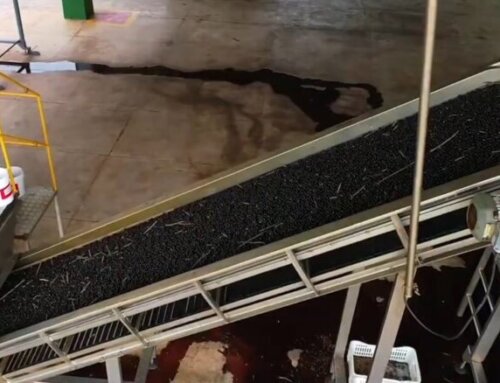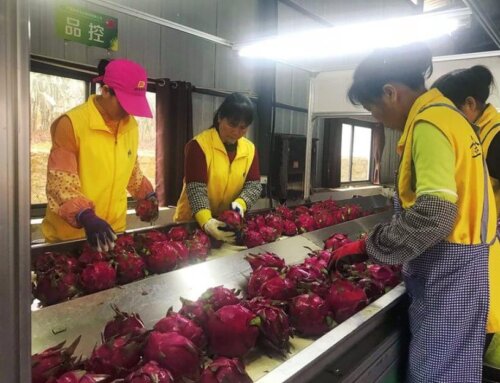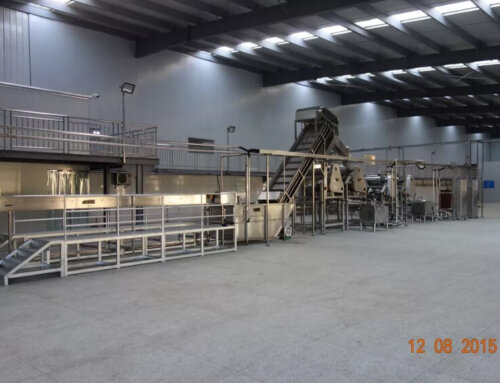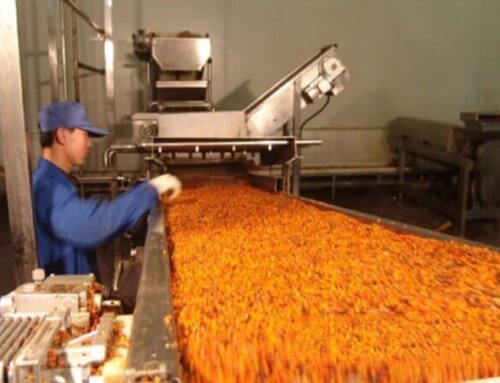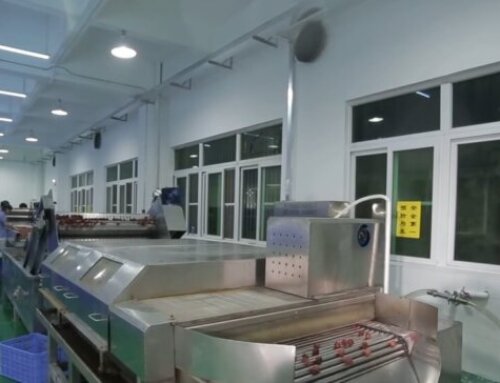Project Description
Aloe Vera Processing Line
Aloe Vera Processing Line Description
1. The potent medicinal properties of aloe vera ingredients have been widely used in food, pharmaceutical and cosmetic industries. Aloe contains about 75 active ingredients, including vitamins A, C, E, B12, folic acid, cholinease, minerals such as calcium, copper, magnesium, manganese, selenium, sodium, zinc and potassium, as well as sugars and amino acids (muscle must ), salicylic acid, lignin and saponins, antioxidants that are vital to the human body. Drinking aloe vera juice helps control blood sugar in diabetic patients and lower blood lipids in hyperlipidemia patients.
2. Different products can proceed from aloe vera whole leaf and gel like food products aloe vera puree, juice, Aloe health drink, powder and aloe vera dessert.
3. The whole Aloe Vera processing line includes aloe vera leaves washing, sanitation and rinsing, aloe vera leaves bottoms, tips and side thorns cutting and discarded, aloe vera peeling machine, aloe vera gel and pulp extraction machine, aloe vera gel filtration, aloe vera puree concentrating, sterilizing and filling machine, aloe vera juice centrifuge type extracting machine, aloe vera juice blending tanks, aloe vera juice sterilizing, filling and packing machine, CIP cleaning system and RO water treatment system.
4. The end products such as aloe vera puree, juice or drinks can be filled into aseptic bags, drums, bottles or tetra pak cartons; aloe vera gel can be filled into bottles or jars; aloe vera powder can be filled into pouches or plastic bottles. The capacity for the aloe vera processing line ranges from 1T/H-30T/H with fresh aloe vera leaves input.
5. The aloe vera consists of an outer thick rind and viscous, jelly mucilage layer attached to the inner surface of the rind. The processing of aloe vera is mainly to remove the outer surface thick rind, then to get the viscous jelly gel, the gel contains 98.5% water having PH value of 4.5 and also contains many polysaccharides.
6. One whole aloe vera leaf contains 10% tips, edges and bottom thorns, 45% peel. The aloe vera juice or gel yield rate is about 40%-50%.
7. After the aloe vera is harvest from the field, the processing must be completed within 36 hours, otherwise the biological activity will be lost at ambient temperature.
Aloe Vera Processing Line End Products
—Aloe vera puree concentrated: 30-32 Brix, the end products can be filled into aseptic bags or drums.
—Aloe vera gel: The aloe vera gel is a colorless and transparent liquid, consists mainly water, which is extracted directly from aloe vera leaves. It is mainly used in the food, cosmetics, and pharmaceutical industries. The aloe vera gel processing involves aloe vera leaf harvesting, washing, peeling and filleting, aloe vera gel extraction and filtration, gel stabilization, homogenizing and filling process.
—Aloe vera juice drinks: The aloe vera gel after extracted, then mixed with lemon juice, pure water and other ingredients, after homogenizing, sterilizing, then filled into small bottles or metal cans.
—Aloe vera powder: The aloe vera powder processing includes fresh aloe vera leaves washing, peeling, gel extracting, separating, filtration, then evaporating and spray drying into powder, then filling into the tin cans or pouches.
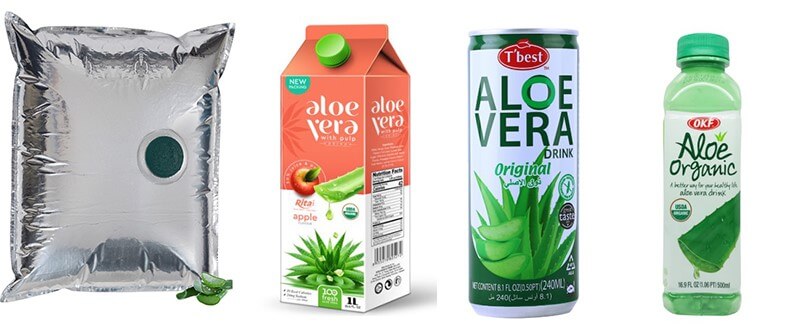
Aloe Vera Processing Line Technological Flowchart
Aloe vera juice processing line technological flowchart
Fresh aloe vera after harvesting, using sodium solution and pure water to soaking and spraying washing, then cut the aloe vera top, bottom and side thorns manually, after that, you can use the aloe vera peeling machine to remove the thick rind peel in the outlayer or hand filleting the peel. Then we obtain the aloe vera gel, now just cut the aloe vera gel into pieces and ground into slurry, then stored into insulation tank with 4℃, to slow down the enzymatic and microbial deterioration of the gel, one pasteurizer is used to treat the material(65℃ for 3 min), then flashing cooled to 55℃ for enzymatic treatment to separate the solids in the gel. And then the filter press or decanter centrifuge separator is used to extract the juice from the aloe vera gel. Subsequent processing includes decolorization by activated carbon in decolorization tank, adding of preservatives in blending tanks and pasteurizing, filling aloe vera juice.
Aloe vera puree processing line technological flowchart
Fresh aloe vera needs to be cut top and bottom, then it will be washed and peeled, and we get the aloe vera pulp, then the pulp will be fed into the pulping and refining machine to obtain the aloe vera puree. Then the puree will be filtered and concentrated into 30-32 Brix after sterilization/pasteurization and filled into the aseptic bags in drums.

Key Machine Of Aloe Vera Processing Line
Aloe vera washing and soaking machine
When Aloe vera leaves are harvested, it contains dirt and other impurities. The yellow fluid secretion from the harvested leaves should be completely removed from the leaf for its processing and purity of products. The leaves were thoroughly washed with fresh water with air bubble washer. In the Aloe vera processing industry, leaves are initially washed in a 200 ppm solution of sodium hypochlorite sterilizing solution, then use the RO water to spray again to flush the solution.


Aloe vera tip bottom and side thorns cutting
The cutting of aloe vera tip bottom and side thorns also called the trimming process, this process is mostly manual removal of thorns with a knife. Precautions should be taken to avoid contamination of inner part gel to maintain the purity of the products.

Aloe vera filleting and peeling
There are two methods to do the filleting and peeling the rind of the aloe vera. One is hand filleting, in this method, the rind is removed by using a sharp knife. The other method is mechanical filleting, this is the most commonly used method for gel extraction from aloe vera leaves, this process takes place on a conveyor belt, equipped with rollers and blades, the leaf is passed over a blade mounted on a table, the upper rind and lower rind will be removed by the blade, then the gel slices are collected.

Aloe vera juice extracting machine
Three methods can be used for extracting juice from aloe vera gel, the hydraulic press filter, decanter centrifuge separator or spiral juice extractor. Three extraction processes have all separated the solids from the gel to obtain the juice essentially. The aloe vera juice yield rate is about 50% with these methods to extract juice.
Using press filter or decanter to extract juice can avoid the loss of nutrient flavor caused by heating of the juice. And with the screw juice extractor, the juice will be heated when squeezing.
Aloe vera juice decolorization tank
Application of the decolorization via activated carbon purification process has been a common practice in the manufacture of aloe vera leaf juice to ensure that any anthraquinone compounds in the gel are removed. The end product is a juice virtually free of the latex constituents known to have a laxative effect.
The specific operation process is that when the aloe vera juice is heated to 70°C by steam or electricity, 0.3%-1% of activated carbon is manually added to the decolorization tank, and the material is discharged after fully stirring for 30-60 minutes.

Aloe vera juice pasteurization machine
There are two pasteurization processes in aloe vera processing.
The first pasteurization process is after the gel is extracted, biological activity remains essentially intact when the gel is heated at 65℃for periods of less than 15 minutes. Extended periods or higher temperatures will result in greatly reduced activity levels. The best method of pasteurization is HTST, which exposes the gel to elevated temperatures for periods of one to three minutes. Once heated, the gel is flashing cooled to 5℃ or below.
The second pasteurization or sterilizing process is between the blending and filling process. At this step, the aloe vera juice has been finished making, only need to sterilizing or pasteurizing before filling. The pasteurization process is heating the aloe vera juice to 95℃ holding for 15 seconds, then hot filling into bottles or metal cans.

Aloe vera juice filling machine
The aloe vera juice can be filled into small bottles or metal cans. The aloe vera juice filling system is composed of washing, filling and capping/sealing parts, and the filling temperature is 85℃ hot filling.
Another common package is carton filling machine, with this type of filling, the aloe vera juice will be UHT sterilized, then aseptically filled into the cartons.

